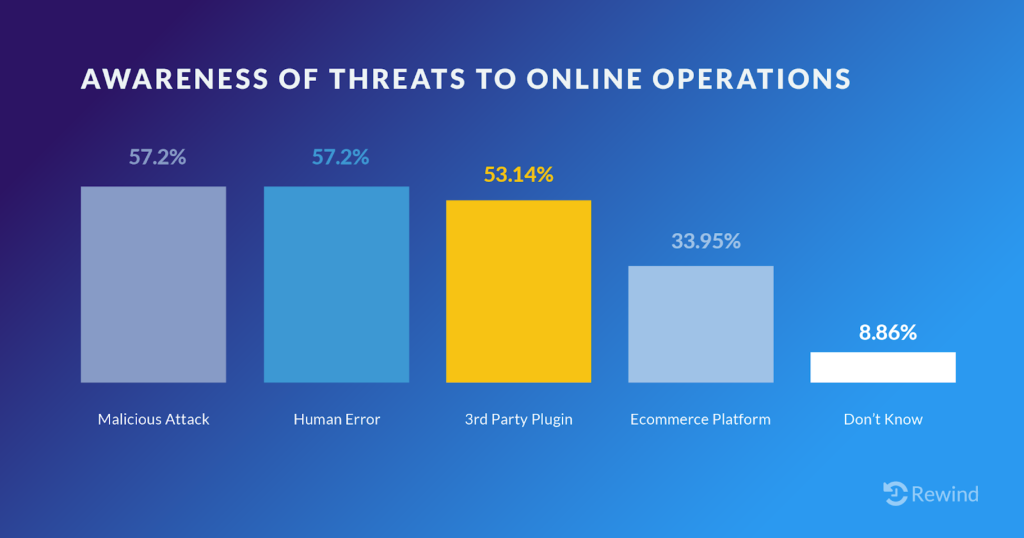Here’s why getting the data back won’t be easy
The world is becoming increasingly digital. We read most of our news online. We watch a lot of our television shows and movies online. According to Statista, over two billion of us, or 25% of the global population, shop online.
Before the global pandemic ecommerce was gradually seeping into daily life. Today, the demand has skyrocketed and online shopping has become a critical service. While it has made life more convenient for consumers, ecommerce merchants face challenges that traditional brick and mortar stores do not. Relying on a digital storefront for 100% of your revenue being the most obvious one.
An ecommerce store can stop working, it can be a victim of cybercrime and it can be compromised in dozens of ways; mostly by human errors. The 2020 Data Protection Survey set out to learn how ecommerce merchants protect their store and fallout from data disasters. It found that one in four stores had lost critical business data. And the fallout of this was an immediate drop in sales.
There is an inherent faith that if data is stored in the cloud, then it’s there forever. But that is not the reality. Here are three misconceptions about data loss, and what it means for your ecommerce store.
Misconception #1: My ecommerce platform will protect and back up my data
There are limitations to relying on an ecommerce platform to store and protect your data. Cloud-based storage is often limited, and often, companies do not provide website backups. The merchant is responsible for store security, including backups and recovery. In the 2020 Data Protection Survey, it was revealed that only 33.9% of respondents were aware that ecommerce platforms can pose a threat to their online store.

Shopify, for example, which has over 1,000,000 active stores, does not have an automatic backup service. The online shopping giant recommends that merchants manually back up their site by saving CSV files of individual parts of the store. This time-consuming exercise is unreliable for complete data control and for saving customizations and images.
Misconception #2: Recovering lost data on my own is quick and easy
Data recovery is not as easy as it seems. CSV files are cumbersome and time consuming to manually upload. A total of 33% of companies in the 2020 Data Protection Survey indicated that it took them up to five hours to recover their lost data. As well, 13% of the companies needed between six to 25 hours for their data recovery, and 8% never fully recovered. The reason for “no recovery” is probably due to the fact that some parts of an ecommerce store can’t be exported and saved. So unless you have the original information, the data is likely gone for good.
Forbes reports that 67% of customers will switch to a different brand if they have a single bad experience on an ecommerce site. According to the 2020 Data Protection Survey Report, 88% of respondents consider customers and orders to be the most critical site content to protect. As well, 89% reported that a loss of sales, orders and/or revenue would be a major impact on their business. Rx Smart Gear faced losing 1,500 orders, or 75 orders a day for 21 days, due to a botched manual upload of 100,000 stock keeping units. Using Rewind’s data protection software, the site was restored in 48 hours.
Misconception #3: If I am careful not to make mistakes, my data is safe
Malicious attacks, such as DDoS attacks, malware, and credit card fraud, can cost an ecommerce store dearly. It is estimated that cyber attacks have forced 70% of small businesses offline. Of this group, one in ten businesses were forced out of business, due to the negative impact on sales. It can cost up to $200,000 to recover from a cyber attack. A little over half of respondents to the 2020 Data Protection Survey, or 57.2% of companies, recognized that malicious attacks pose a threat to their online operations.
“Our online store drives our business; if we don’t have it we have no business”
– response from When The Store Goes Down: 2020 Data Protection Survey
Running an online store is not without its challenges. It is already a major investment to build up a store, let alone handling sales, customer calls and concerns, marketing, and orders and shipping. Do not let losing critical store data add to the challenge.



